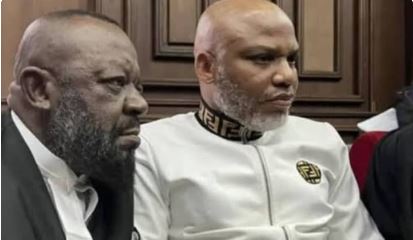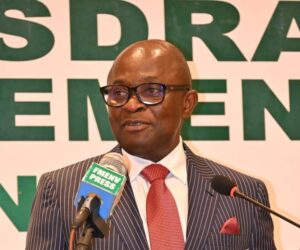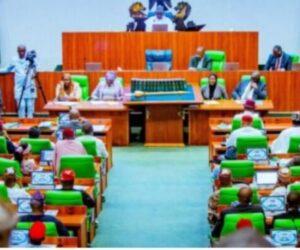2
The leader of the Indigenous People of Biafra (IPOB), Mazi Nnamdi Kanu, has petitioned the World Medical Association (WMA) over what he described as serious health challenges and inadequate medical care while in the custody of the Department of State Services (DSS).
In a letter dated October 3, 2025, and signed by Kanu’s international counsel, Bruce Fein, on his behalf, and addressed to the WMA President, Dr. Jacqueline Kitulu, Kanu claimed that his health condition had deteriorated due to insufficient medical attention in detention.
He stated that he “has been detained in a Nigerian facility in solitary confinement for more than four years without a trial. He was arrested in Nairobi, Kenya, in June 2021.”
The letter, which was copied to the Registrar of the Federal High Court, Abuja; the Department of State Services; the Medical and Dental Council of Nigeria; and the Nigerian Medical Association (NMA), said the situation had reached “a life-threatening threshold.”
It appealed to the WMA to engage with the NMA to ensure that Kanu receives “the highest professional standard of medical care” and that “his medical providers are allowed to work without intimidation or interference.”
Kanu also requested the WMA, directly or through the NMA, to review what he described as irregularities in his medical records while in DSS custody. The letter further sought protection for independent medical practitioners “from any possible retaliation for providing medical care to Mazi Nnamdi Kanu.”
He demanded the release of the NMA medical team’s report of September 22, 2025, which the Federal High Court had directed to be filed within four days.
He warned that any delay could create “the real danger that a replacement panel may be assembled, thereby undermining the medical truth.”
According to the letter, Kanu’s health challenges reportedly began after his detention in Nairobi in June 2021. “On arriving at Jomo Kenyatta International Airport in Nairobi, MNK was taken into custody by masked operatives and held for eight days in a confined room,” he wrote in the letter.
The said he was allegedly denied food, water, and prescribed medications for the first five days, leading to breathing difficulties and weakness, allegation the DSS could be reached for comment as it has no spokesman.
“On the fifth day, when his body began to fail, a doctor was summoned. His blood pressure was dangerously high. MNK was given a 40mg dose of Amlodipine along with a red-coloured liquid,” the letter stated.
Kanu said his treatment in Kenya left him “physically weakened” by the time of his transfer to Nigeria. In the DSS facility in Abuja, blood analysis allegedly revealed “a critical potassium deficiency,” prompting a series of medical prescriptions that reportedly failed to stabilize his condition.
“Whenever potassium supplements were withdrawn, MNK’s levels dropped again to the same life-threatening range,” he claimed, adding that a South African laboratory confirmed the deficiency.
He further alleged inconsistencies in his medical test results under one of the physicians assigned to him in custody. “From the moment he assumed control, the doctor began recording normal potassium levels when in reality they were low,” he wrote.
Under what he described as inadequate care, Kanu reportedly continued to experience nosebleeds, fainting spells, chest pains, headaches, and swelling of the feet.
“Over 50 blood samples have been taken during MNK’s time in DSS custody, but these have yielded no improvement in his health under the management of the assigned doctors,” the letter stated.
He praised Emeritus Professor Martin Aghaji, a respected surgeon, for stabilizing his condition when he was eventually allowed to intervene. “It is no exaggeration to say that without Emeritus Professor Martin Aghaji’s intervention, my health would have deteriorated beyond recovery,” Kanu was quoted as saying.
The letter added that Professor Aghaji confirmed a range of health concerns affecting Kanu’s liver, kidneys, bladder, prostate, and white matter, as well as sleep apnea and severe tinnitus.
“Among the gravest threats to MNK’s survival today is tinnitus. It robs him of sleep, exacerbates hypertension, magnifies chest pain, and places him in immediate danger of stroke, collapse, or sudden death,” Fein wrote.
He said sleep deprivation combined with existing hypertension, organ strain, and potassium instability “places MNK in immediate danger of stroke, collapse, or sudden death.”
According to the letter, the NMA’s medical assessment of September 22, 2025, confirmed Aghaji’s findings and identified an additional condition requiring nasal surgery. “The Federal High Court has ordered that the report of this assessment be submitted within four days,” he wrote.
“Any delay creates the real danger that a replacement panel may be assembled, thereby undermining the medical truth.”
The letter urged that the conduct of all medical personnel involved in Kanu’s treatment be reviewed to ensure compliance with professional ethics. “Neglect of tinnitus and sleep deprivation shows a disregard for the life-threatening impact of untreated conditions,” Fein stated.
He appealed to the WMA to ensure the release of the NMA report, protect Professor Aghaji’s role as Kanu’s physician, review the treatment he has received, and recognize tinnitus and sleep deprivation as urgent medical issues.
“Without immediate decisive action by the WMA and NMA, the medical neglect of MNK may prove fatal,” he warned.







